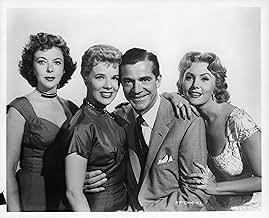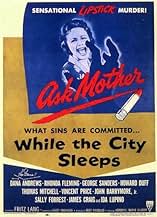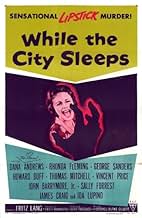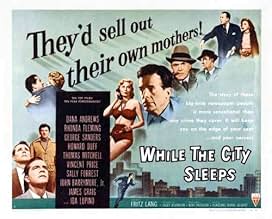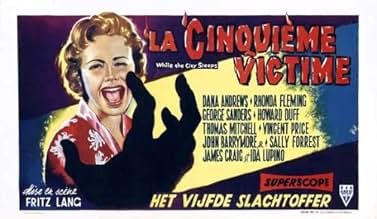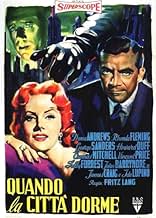Aggiungi una trama nella tua linguaA serial killer has been killing beautiful women in New York City and the new owner of a media company offers a high position in the company to the first of his senior executives who can get... Leggi tuttoA serial killer has been killing beautiful women in New York City and the new owner of a media company offers a high position in the company to the first of his senior executives who can get the earliest scoop on the case.A serial killer has been killing beautiful women in New York City and the new owner of a media company offers a high position in the company to the first of his senior executives who can get the earliest scoop on the case.
- Regia
- Sceneggiatura
- Star
- Robert Manners
- (as John Barrymore Jr.)
- Judith Felton
- (as Sandy White)
- Tim - Police Desk Sergeant
- (as Larry Blake)
- Mike O'Leary
- (as Edward Hinton)
Recensioni in evidenza
Nice and entertaining thriller-plus with the emphasis on the reporters' ruthless methods of gaining information rather than on the killer's motivations. This engaging film contains murder thriller, plot twists , suspense and some far-fetched elements including plausible events. The movie is both a slick, smooth crime yarn and a jaded look at the morals of big-city newspapermen. This is a real critical on the American journalism; as this tale develops, a variety of submerged elements slowly surfaces to make this picture far more one of intrigue. It packs a memorable subway pursuit climax, though suffers only from having too many roles which throws meat to a hungry familiar cast. The movie was adapted from a novel, "The Bloody Spur" by Charles Einstein (1953), which in turn was based on a real murder case that took place in 1946. The picture ¨White the city sleeps¨results to be a classic film (1956) by Fritz Lang, a brilliant and masterly exposition in which Lang gets a first-hand view of the journalistic system, being finely starred by a great star-studded-cast. Acceptable acting from starring Dana Andrews, he is well cast in the impulsive main role, playing a writer who attempts to chase a series killer, while Sally Forrest as his girlfriend, but she seems a little long in the tooth in a role that called for more sparkle. And a good all-star-cast, such as: Rhonda Fleming , George Sanders, Howard Duff, Thomas Mitchell, Vincent Price, John Barrymore Jr, James Craig, Ida Lupino, Mae Marsh, and Robert Warwick.
It displays an adequate and atmospheric musical score by composer Herschel Burke Gilbert. Functional and evocative cinematography in black and white by Ernest Laszlo. This decent motion picture was compellingly directed by Fritz Lang who gets first-hand view of journalism. Here Lang completed 20 memorable years in Hollywood after a distinguished early career in the German cinema that incluyed such classics as Metropolis. Being one of Lang's last Hollywood movies and last big success, it has improved with age, although it still doesn't grip as it should, at times. This great German director Lang made various prestigious silent movies as ¨Metrópolis¨ , ¨Woman in the moon¨ , ¨Doctor Mabuse¨ , ¨Spies¨ , ¨Spiders¨ , ¨Nibelungs¨. And shot other excellent and classic films in all kinds of genres, such as: adventure movie as ¨Moonfleet¨ ; noir films : ¨Beyond a reasonable doubt¨, ¨While city sleeps¨ , ¨The big heat¨ , ¨Clash night¨ ; Drama : ¨Woman in the Window¨ , ¨Human Desire¨ , ¨Scarlet Street¨ , ¨Fury¨ ; Western : ¨Rancho notorious¨ , ¨Western Unión¨ , ¨Revenge of Frank James¨. Rating: 6.5/10. Better than average.
One of the men runs the newspaper, another the wire service, and the third's angle is to take advantage of an affair he's having with the new boss's wife (Rhonda Fleming). The first two men scheme away, determining when to broadcast information and when to hold it for maximum effect (and personal gain). They think about how to add little elements in the story, like referring to one of the victims as "the attractive librarian," in order to titillate readers. They also use personal connections in the police force in order to get direct access to information (and even watch interrogations). It all becomes a bit of a circus, and the tragedy of the murders is lost, which is of course the point.
The main character is another man, a reporter (Dana Andrews) who is not involved directly in the fray, but is doing a lot of the investigation into the murders. He's also involved in a relationship with a woman in the office (Sally Forrest), though their relationship wasn't all that inspiring to me. The real issue, however, is that his actions don't seem all that believable, e.g. Is he really going to speak directly to the killer over the airwaves in the way he does, divulging information like that? Use his fiancée as bait? Swing from getting engaged to immediately carrying on with Ida Lupino when she tempts him? And is the media really going to be tasked with solving the crime, instead of just reporting on it?
I think that to be a satire, it needed to be a little more believable, and I could have used a little bit more of a shift into the darkness of the crime itself. The ending also undermines the film's message, and it reminded me a teeny bit of Otto Preminger's critique of the justice system in 'Anatomy of a Murder' - not immediately obvious that the critique is the main point, and then an ending that seems a little off in tone.
I did like how Lang seemed to enjoy himself thumbing his nose at the production code. The affair between Fleming and Craig is crystal clear, and under the guise of telling her husband she's going to her mother's. Andrews makes it clear to Forrest that he thinks people should "find out" about each other before marriage, and Lupino later quips that all men are polygamists as she flirts with him. Before marveling at his Forrest's nightgown (a "shorty" that "you can see right through") Andrews will also say "Get your things off; it's your wedding day, you want to look nice," which had me chuckling. It makes the fact that the middle-aged married couple (Mitchell and his wife) appearing in separate beds when he's phoned in the middle of the night extra comical, and one can sense Lang was well aware of that.
Lang may have taken joy in all this and the subversive commentary about the wonders of a free press, but it's hard to fathom it being among his personal favorite films he made, particularly given his body of work. It's entertaining enough to watch though.
The film is set in the world of newspapers and news agencies, so you expect an aura of venality from the outset. Vincent Price is the vain, self-centered scion of a recently deceased magnate who has taken over his father's business and wants someone else to do all the work. So he creates a new executive position then sets three of his top men against each other vying for the job. The one who 'catches' or names the serial killer terrorizing women in New York, gets it.
Like many of Lang's films, "While the City Sleeps" had the tawdry feel of a B-movie. There is a kind of rough urgency to it that a more main-streamed movie might have lacked. (You could say Lang's genius was for making silk purses out of sow's ears). He didn't work with 'stars' but character players. About the biggest name in the movie and the 'star' of the picture is Dana Andrews, (superb, he was a very under-rated actor), as the Pulitzer Prize winning journalist who, like many of Lang's characters, is less noble than he first appears. As for the rest, despite there being two Oscar winners in the cast, (George Sanders, one of his poorer performances, and Thomas Mitchell, excellent), they were mainly the stable diet of the B-movie, though that said there is a terrific performance from the under-rated Sally Forrest as Andrews' girl who he is not above using as bait to catch the killer and a typically flamboyant one from Ida Lupino.
After this, Lang was to make only one more film in America before returning to his native Germany, the equally cynical "Beyond a Reasonable Doubt". Indeed it's Lang's cynicism and his critique of American values and mores that set him apart, that put him, like those other European émigrés, Otto Preminger and Douglas Sirk at a critical remove from his American counterparts. In this respect, perhaps, the only American who can be compared to him is Samuel Fuller.
The film, a dazzling allegory on media manipulation and modernity may not work on single viewing and perhaps that's why it's so underrated, despite a superb cast: Dana Andrews, George Sanders, Ida Lupino, Vincent Price, Mae Marsh, Rhonda Fleming and John Drew Barrymore(the son of the great John Barrymore).
In discussing the picture, Lang often compared it to his German masterpiece, "M"(1931) and the comparison is not inapt. In "M", Peter Lorre's Hans Beckert terrorizes the whole city and creates a paranoia among its citizens. In "While the City Sleeps", Manners's crimes mainly function as a gimmick for the press to sell papers while the normal life in the city seems to continue. Rather than simply conveying the necessary information in "M", the media here in "While the City Sleeps" (consisting of an interplay between television and newspaper) is much more ironic and cynical: they use Manners and his victims to terrify the public to sell more papers, something that is equally true today as it was back in 1956.
Not to be missed.
Lo sapevi?
- QuizThe movie was adapted from a novel; The Bloody Spur by Charles Einstein (1953) which was based on a real murder case that took place in 1946. In that year, William Heirens killed three women and left a message scrawled in lipstick on a bathroom mirror after the second murder. In the message, he urged the police to catch him before he killed again. Because of this, the press dubbed him "The Lipstick Killer".
- BlooperWhen Robert Manners (John Drew Barrymore, as John Barrymore Jr.) is watching Edward Mobley (Dana Andrews) on TV, he is clutching a copy of "Tales From The Crypt". When he drops it to the floor, a closeup of the comic book now shows it to be titled "The Strangler".
- Citazioni
Ed Mobely: You know, you have very nice legs.
Nancy Liggett: Aren't you sweet.
Ed Mobely: Nice stockings too. What holds your stockings up?
Nancy Liggett: There's a lot your mother should have told you.
Ed Mobely: I didn't ask my mother. I asked you.
- ConnessioniFeatured in Histoire(s) du cinéma: Toutes les histoires (1988)
I più visti
- How long is While the City Sleeps?Powered by Alexa
Dettagli
Botteghino
- Lordo in tutto il mondo
- 7652 USD
- Tempo di esecuzione1 ora 40 minuti
- Colore
Contribuisci a questa pagina



